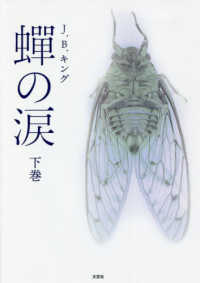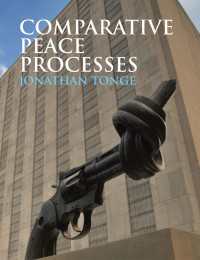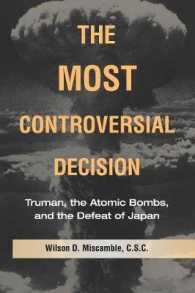- ホーム
- > 洋書
- > 英文書
- > Psychology
基本説明
Provides a thorough examination of argumentative and aggressive communication.
Full Description
Arguments, Aggression, and Conflict provides a thorough examination of argumentative and aggressive communication. Editors Theodore A. Avtgis and Andrew S. Rancer bring together a score of prolific and informed authors to discuss aspects of the conceptualization and measurement of aggressive communication. The book features an exclusive focus on two "aggressive communication" traits: argumentativeness and verbal aggressiveness, one of the most dominant areas of communication research over the last twenty five years both nationally and internationally. The chapters include cutting-edge issues in the field and present new ideas for future research.
This book is a valuable resource for instructors, researchers, scholars, theorists, and graduate students in communication studies and social psychology. Covering a variety of topics, from the broad-based (e.g. new directions in aggressive communication in the organizational context) to the more specific (e.g. verbal aggression in sports), this text presents a comprehensive compilation of essays on aggressive communication and conflict.
Contents
Preface Part I: Conceptualization and Operationalization of Argumentative and Aggressive Communication 1. Approaches to Understanding Argumentative and Aggressive Communication (Michael Beatty, Alan Heisel, Brian Patterson, Kevin Wright) 2. The Measurement of Argumentative and Aggressive Communication (Timothy Levine) 3. Global Perspectives on Argumentative and Aggressive Communication (Yang Lin, Anne Maydan Nicotera) Part II: Contextual Research and Argumentative and Aggressive Communication 4. Instructional Communication (Paul Schrodt, Scott Myers) 5. Mass and Mediated Communication (Rebecca Chory, Anthony Roberto) 6. Argumentativeness and Verbal Aggressiveness in Applied Communication a. Political Communication (John Seiter, Robert Gass) b. Health Communication (Theodore Avtgis) c. Organizational Communication (Theodore Avtgis, Rebecca Chory) d. Sports Communication (Jeffrey Kassing) e. Negotiation (Jill Rudd) f. Nonverbal Communication (Andrew Rancer) g. Group Communication (Carolyn Anderson) h. Family Communication (Sally Vogl-Bauer) i. Teasing and Humor (Rachel DiCioccio) Part III: Specific Factors Influencing Argumentative and Aggressive Communication 7. Argumentativeness, Verbal Aggressiveness, and Other Traits (James McCroskey, Virginia Peck Richmond, Dale Hample) 8. Factors Stimulating the Use of Verbal Aggression (Charles Wigley) 9. The Instrumental Use of Verbal Aggression (Matthew M. Martin)
-

- 和書
- 蝉の涙 〈下巻〉
-

- 洋書電子書籍
-
和平プロセスの比較
Compar…

![Kriegsgeschichte von Bayern, Franken, Pfalz und Schwaben von 1506 bis 1651. [With preface by C. von Spruner.] Erste Band](../images/goods/../parts/goods-list/no-phooto.jpg)




